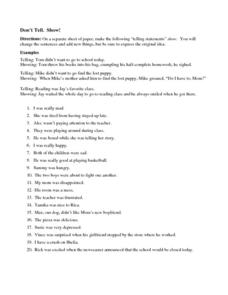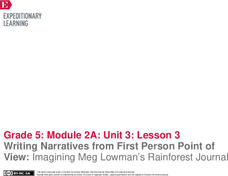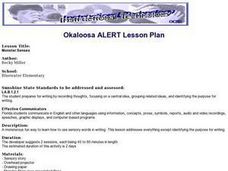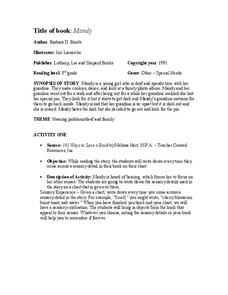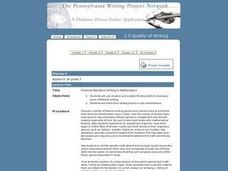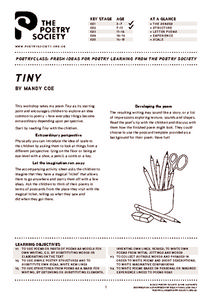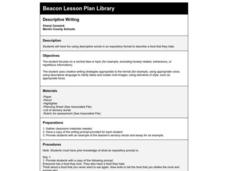E Reading Worksheets
Don't Tell. Show!
As part of a study of narrative writing, young story tellers are asked to revise 20 telling sentences and create showing ones.
EngageNY
Writing Narratives from First Person Point of View: Imagining Meg Lowman’s Rainforest Journal
I spy with my little eye! Learners observe page 23 in The Most Beautiful Roof in the World and practice what they would add to a field journal. They discuss how details from the text help add to their thoughts. To finish, readers use...
Curated OER
Paper Dragon Fairy Tale
Imagine a beautiful rainbow-colored dragon flying free in the air. With powerful imagery and sensory language, a reading passage prompts learners to follow the plot of a short story and answer five comprehension questions.
Curated OER
Interactive Student Notebook for Middle School ELA
Encourage creative, independent, and reflective thinking and writing throughout the school year by having your class members keep Interactive Student Notebooks (ISN). Here you'll find a presentation designed to introduce students to the...
EngageNY
Grade 10 ELA Module 1: Unit 3, Lesson 2
Sometimes, sensory details can bring you back to a familiar place. Study the setting descriptions from a critical chapter in Amy Tan's A Joy Luck Club, and discuss how they enhance the book's plot and contribute to a central theme.
Curated OER
Monster Senses
Second graders listen to a story that contains many sensory words to describe an object. They listen a second time using a signal to indicate when they hear a sensory word. They write a short story about a monster using appropriate...
Curated OER
Mandy
Third graders read Barbara D. Booth's, "Mandy" while noting each time they read a sensory detail. They read about the young girl in the story who is hard of hearing and determine how her other senses are heightened. Also, they determine...
Curated OER
Poetry: What's on Your Plate?
Students create original poetry on the subject of food. In this poetry writing lesson, students use sensory details about a food item to create a class poem. Students then write short poems with one sensory detail and add another...
Curated OER
Lesson Three: Go Free or Die
Fourth graders look for sensory details and figurative language. In this reading strategy lesson, 4th graders read the story Go Free or Die by J. Ferris and complete a chart with figurative language. They use a word wall in the class to...
Curated OER
Every Dog Has Its Day
Students explore the use of imagery in writing. In this writing lesson, students create a writing piece that features sensory images without resorting to the use of clichés.
Curated OER
Poetry: What's on Your Plate (Part 2)
Middle schoolers write a short paragraph using strong descriptions. In this using modifiers lesson, students define modifier, adjective, adverb, metaphor, and simile. Middle schoolers then write a journal entry in which they write...
Curated OER
The Malnourished Paragraph
Pupils revise writing to improve style, word choice, sentence variety and subtlety of meaning after rethinking how questions of purpose, audience and genre have been addressed. They recognize the importance of details in writing.
Curated OER
From Ordinary To Extraordinary Writing
Students investigate the quality of writing while focusing on the use of sensory words to convey meaning and ideas. The power of similes and metaphors is emphasized while they create and edit works of writing. The skill of descriptive...
Curated OER
Descriptive Writing
Fifth graders develop compositions on self-selected topics. They choose a topic based upon their ability. Individual pupils earn points for each activity completed. Students use descriptive writing as they support their composition...
Curated OER
Haiku: Observation and Writing in the Japanese Garden
Learners observe a Botanical Gardens. Upon returning to the classroom, students write their own Haiku based on their observations.
Curated OER
Fictional Narrative Writing in Mathematics
Fifth graders discuss variety of fictional writing genres and connect each to familiar story that has been read, use creative and analytical skills to develop original piece of fictional writing that incorporates math skill, and share...
Curated OER
Internet: Writing Friendly Letters Via Email
Pupils view a Powerpoint presentation on writing and sending email. After examining a Website about the parts of a friendly letter, they compose and send their own letters via email. Teachers set up an email/pen pal account so students...
California Federation of Chaparral Poets, Inc
Poetic Devices
Have everything you need to know about the elements of poetry with a nine-page handout. Split into four categories—word sounds, meanings, arrangement, and imagery—budding poets may reference terms, read definitions, descriptions, and...
Poetry Society
Tiny by Mandy Coe
Introduce magic and imagination into your classroom with a poetry activity. Learners read the poem "Tiny" by Mandy Coe and use their magic tickets to visit any place they can think of! The final result is a poem describing where they...
Curated OER
My Favorite Room - Brainstorming Sheet
In this writing worksheet, students brainstorm a writing piece about their favorite room. They write a purpose sentence, and fill a chart that describes the room using the senses. They write a draft using the purpose sentence and three...
Curated OER
My Favorite Room
Young scholars practice describing a room. In this descriptive writing lesson plan, students use all of their five senses to describe their favorite room. The teacher will model for the class by creating a word list that describe the...
Curated OER
Dear Diary
Students analyze a piece of writing by creating diary entries based on a character. In this reading comprehension lesson plan, students read an assigned book with their classmates and create a sketch of what they believe the main...
Curated OER
Sensory Competition
Students explore examining something through one sense but experience competing input with another. The lesson also shows the plasticity of the brain and other cognitive functions.
Curated OER
Descriptive Writing
Third graders have fun using descriptive words in an expository format to describe a food that they hate. They utilize a planning worksheet that's imbedded in this plan before they begin their drafts.
Other popular searches
- Writing Sensory Words
- Using Sensory Words in Writing
- Writing Using Sensory Detail
- Sensory Writing Prompts
- Sensory Writing Rubric
- Rubric for Sensory Writing
- 5th Grade Sensory Writing
- Writing Sensory Poetry
- Multi Sensory Writing
- Writing With Sensory Details
- Sensory Writing Activities


